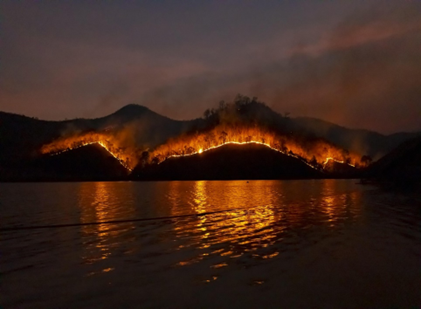Fire, smoke, and pollination: How climate change is silently disrupting nature’s partnerships
Climate change is actively rewriting the rules of life on Earth. Among the most overlooked victims of this disruption are…

 Climate change is actively rewriting the rules of life on Earth. Among the most overlooked victims of this disruption are the partnerships between plants and pollinators.
Climate change is actively rewriting the rules of life on Earth. Among the most overlooked victims of this disruption are the partnerships between plants and pollinators.
As wildfires become more frequent and intense, a new and insidious threat is emerging: smoke.
Beyond the charred landscapes and lost habitats, wildfire smoke may be quietly choking one of nature’s most vital interactions.
A recent study by Kaminskaia et al. reveals how heat and wildfire smoke interact to dramatically alter pollination dynamics, with significant consequences for biodiversity, food security, and ecosystem resilience.
The risk to flowers and nectar
In the recent study, plants were exposed to both higher temperatures (+2°C) and reduced sunlight (to mimic wildfire smoke), which produced about 91.5% less nectar, resulting in significantly fewer flowers.
The impact of this dramatic yield decrease is critical, as pollinators (such as bees) depend on nectar for survival. Less nectar means less food, fewer visits, and declining bee health. The smoke may not burn the plants, but it starves their bee allies.
You’ve no doubt heard the phrase: ‘busy as a bee’’ – a nod to their famously tireless nature. But under these challenging conditions, bees are being pushed to work even harder, yet they’re able to forage far less.
The study revealed that under hot and shaded conditions (mirroring the intense heat and thick smoke of wildfires) bees visited flowers less frequently but lingered longer on each one. This suggests that they have difficulty locating and/or accessing nectar, forcing them to broaden their diet, and reducing specialisation.
The impact on bee behaviour
Such a disruption in bee foraging patterns means lower pollen transfer, lower seed production, and a breakdown in plant reproduction over time.
Not all heat is bad for bees though – in fact, a modest temperature rise of just 1°C increased bee offspring by an impressive 48%, likely because conditions approached their optimal range. But when smoke was added, these benefits vanished. The findings highlight that it’s not just temperature that matters – light availability is just as important.
In other words, while slight warming might help bees in the short-term, the combination of rising temperatures and wildfire smoke reverses them, disrupting both plant productivity and bee behaviour, and ultimately threatening ecosystem balance.
The impact of wildfires on plants
In a surprising twist, some plants appear to boost their chances of survival under wildfire-like stress.
Seeds from heat and smoke stressed plants showed the highest germination rates, likely due to reduced dormancy mechanisms that that fast-track growth in hostile environments. While this may be an adaptive survival strategy, it’s not enough to offset the toll: fewer flowers, less nectar, and disrupted pollination still threaten long-term plant success.
If wildfires become an annual occurrence, smoke-filled summers could drastically disrupt the delicate relationship between plants and their pollinators.
Specialist pollinators (those that rely on a narrow range of plants) are especially vulnerable. These breakdowns can ripple through entire ecosystems, weakening food webs and reducing crop yields.
The study by Kaminskaia et al. serves as a stark warning – urgent action is needed to protect these vital connections.
The challenge requires further research
More long-term research is urgently needed to understand how climate-driven stressors impact plants and pollinators across generations.
Ecosystem-wide studies are essential, as different species will respond in vastly different ways to rising temperatures and smoke exposure. This research shouldn’t be limited to scientists, but should include other key stakeholders in this space such as farmers, food producers and consumers.
Data is the key to investigate restoration and conservation strategies, such as planting fire-resilient, high-nectar species to support pollinators during stressful conditions.
A delicate balance in a changing environment
In a warming world darkened by smoke, the once-reliable relationship between flowers and pollinators is under threat.
Some species may adapt but many, including vital bee populations, will not. Protecting this fragile partnership requires more than just tackling climate change; it demands urgent action to address the long-term effects of intense fires, thick smoke, and the silent hunger they leave behind.
When the flowers fade and the bees fall silent, the consequences won’t end at the forest’s edge, they’ll ripple through our fields, threaten our food supply, and shape the future we all share.
To discover more about how AgriSound is leading the way in understanding pollinator activity for the long-term benefits of global food production and the protection of crucial biodiversity, contact us today.
Read the full study, discussed in this article, here.

